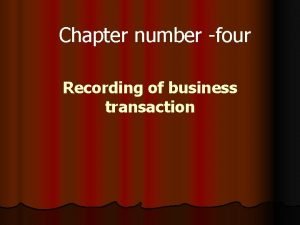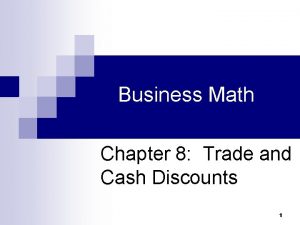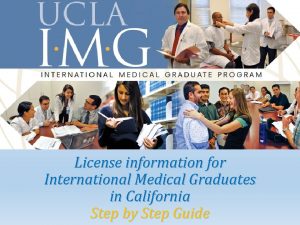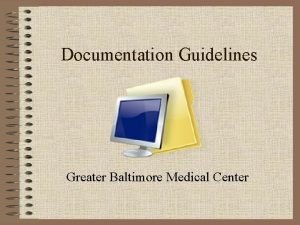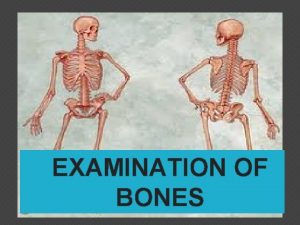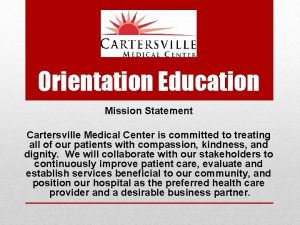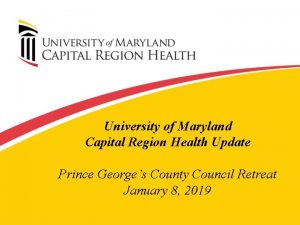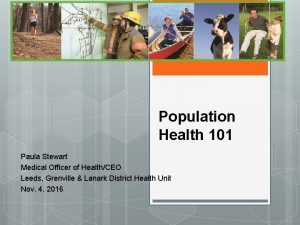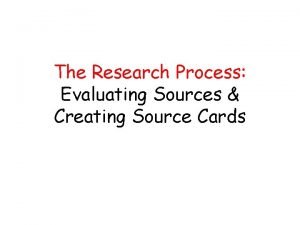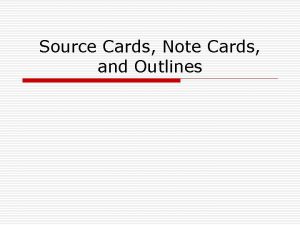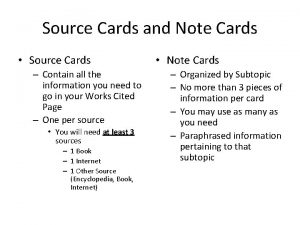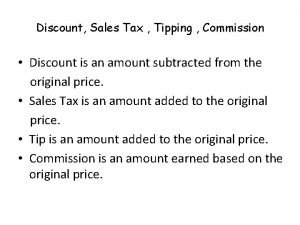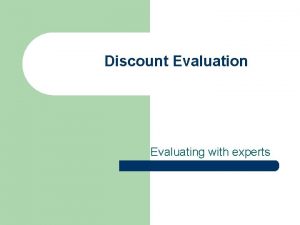Medical Discount Cards a k a discount health














- Slides: 14

Medical Discount Cards (a. k. a. discount health plans) Florida Office of Insurance Regulation August 2006 Mila Kofman, J. D. Associate Professor Health Policy Institute, Georgetown University 2006

Discount Medical Cards: What Are They and How Do They Work? • Not insurance: patient responsible for cost of medical care and services • Providers’ prices are discounted – Cards promise discounts up to 90% – Patients must pay bill at time of service to receive discount • One time enrollment fee (up to $199) • Monthly fee ($12. 99 to $99. 95/single person) – Credit card or bank account authorization required Georgetown University 2006

Marketing • Multi-level (pyramid) marketing – Significant price differences ($54. 95 v. $120/month for same program) • Promoters not licensed/not regulated • Few sold by insurance agents • Methods: TV, radio, internet, fax, e-mail, telemarketing, associations, retailers, credit card companies, etc. • high-pressure sales tactics, misleading & false information Georgetown University 2006

Marketing: insurance buzz words – “every one is accepted regardless of past medical history” – “no underwriting” – “ 100% approval” – “no one can turn you down because you’re too sick or too old” – “no exclusions for preexisting conditions” & – “no medical forms to fill out” Georgetown University 2006

Georgetown University 2006

Georgetown University 2006

Georgetown University 2006

Fraud and Abuse • Consumers are told they are buying health insurance • No networks • Unauthorized credit card charges • Unauthorized withdrawals from bank accounts • Charges post-cancellation • Discounts significantly smaller than promised Georgetown University 2006

Discount Medical Cards Growing • Employers and individuals – West study of secondary workers • High prices and limited access to private health insurance Georgetown University 2006

Our Research • Nearly 30 cards (disconnected telephone numbers, did not offer discounts in the Washington DC area, not open for new enrollment, or was health insurance contrary to ads) • Enrolled in 5 cards – – – high cost (enrollment and monthly fees), low or no discounts, significant time spent finding a participating provider cash discounts available without card no value Research funded by the Commonwealth Fund Georgetown University 2006

RECOMMENDATIONS FOR CONSUMER PROTECTION • PRE AND POST PROBLEM AUTHORITY – Standards for companies – Standards for products Georgetown University 2006

Regulation • Federal government – none – FTC (alerts and investigations) • States – Attorney General – post problem limited authority – Insurance regulators Georgetown University 2006

Regulation Approaches: • • • No consumer protections Limited authority (notice/limited registration) Registration/licensing with denial and approval authority (limited standards for products) – Montana • Licensing (rate and product protections and standards for companies) (FL model) – Lower standards than for insurance products • Regulate as insurers (CA) Georgetown University 2006

Contact information: Mila Kofman, J. D. , Associate Professor Georgetown University Box 571444, 3300 Whitehaven Street, NW Ste 5000 Washington, DC 20057 -1485 202 -784 -4580 direct, mk 262@georgetown. edu, hpi. georgetown. edu, www. healthinsuranceinfo. net Georgetown University 2006
 Source cards mla
Source cards mla Discount allowed and discount received
Discount allowed and discount received Trade discount vs sales discount
Trade discount vs sales discount Net of trade discount
Net of trade discount Differentiate single trade discount from discount series
Differentiate single trade discount from discount series Doctors license number
Doctors license number Greater baltimore medical center medical records
Greater baltimore medical center medical records Hepburn osteometric board
Hepburn osteometric board Torrance memorial transitional care unit
Torrance memorial transitional care unit Cartersville medical center medical records
Cartersville medical center medical records Umd capital region health
Umd capital region health Population health 101
Population health 101 Pinellas county report cards
Pinellas county report cards What are source cards?
What are source cards? Lominger competencies cards
Lominger competencies cards


